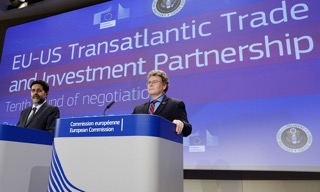Why TTIP? It is just geopolitics, and it is crucial
External Relations 14 September 2015Since negotiations started in 2013, the Transatlantic Trade and Investment Partnership (TTIP) to be signed together with the US, is literally on fire. Here we are going to talk about one of the most discussed issues in the whole European continent. But from a different point of view: the geopolitical one. Let us see why.
We all know very well what is going on nowadays, all over Europe.
On the one hand, supporters of the agreement try to overcome the wide opposition refining communication strategies which focus exclusively on the economic advantages that Europe will gain joining the partnership: removing the remaining tariffs, aligning rules and standards, and reducing the paperwork required for doing transatlantic business should finally lead to economic growth. But, of course, the full economic gains of TTIP are unlikely to be visible for several years after its implementation.
On the other hand, anti-TTIP protests shut down parts of Brussels in December. Nobody is demonstrating in favor of a deal. The civil society is afraid and complains about the consequences that such agreement will exert on the European regulatory system. On the ground there is a huge fear of American standards that would finally subordinate European democracies to US corporate interests. Furthermore, everything is fueled by a growing anti-Americanism, protectionism and eurosceptic sentiments.
While the economic benefits of TTIP are difficult to quantify, the geostrategic impact warrants closer attention in Europe.
A successful TTIP would bring Europe a number of strategic benefits. TTIP would allow the West to set global trade standards, strengthen Western diplomacy, improve European energy security and reaffirm transatlantic ties.
States use economic competition in pursuit of geopolitical objectives. TTIP is a project that aims to build up the dominance of the two largest economic powers in the world, the European Union and the United States, which still account for 50 percent of the global economic output and one third of all global trade. Within the framework of the WTO, developed countries and their competitiveness have experienced the increasing pressure in negotiations exerted by the fast growing economies of the large emerging countries: China, India, Turkey, Brazil and Russia.
After years of crises, low growth and political tension in the West, China and the other emerging economies are therefore using their economic success as a springboard to political influence. Russia – though certainly not an economic success – has created the Eurasian Economic Union to look like a quasi-EU while promoting Russian political and economic interests in its neighborhood. China is trying to set up alternatives to Western-dominated international financial institutions. Moreover, Paris, London and Berlin stimulated the American resentment when they announced that they would join the Asian Infrastructure Investment Bank as founding members. Of course, the United States are especially concerned that the Chinese-led institution could be used as a tool to circumvent the World Bank. In this regard, the creation of a transatlantic trade bloc would strengthen the Western economic model against the growing influence of the Rest of the World. Size matters, especially in the geopolitics of trade.

Ignacio Garcia Bercero (left), the EU chief negotiator for TTIP, and his US counterpart Dan Mullaney. Photo credits: Thierry Charlier/AFP/Getty Images
Apparently TTIP can turn into a new centre of gravity for global trade. Once an agreement has been reached, all those countries, which so far have already settled agreements with either the US or the EU, should be offered access to TTIP. Necessarily it would spread the transatlantic trade model to the three corners of the globe, carrying all those regulating procedures, standards and common practice that will lead to a new restructured colonialism. Regional trade agreements such as the TTIP typically generate gains, if any, only for those directly involved. As such, a recent study by the IFO Institute, a conservative economic think tank in Munich, concludes that bilateral agreements are inherently discriminatory to those excluded from the agreement. In other words, trade and investment benefits are denied to third-countries.
Then there is TTIP’s energy dimension. The US fracking revolution has introduced the opportunity for the country to become a global power exporting Liquid Natural Gas (LNG). The EU hopes American LNG will help diversifying European energy imports and, by doing so, reducing EU dependence on Russian gas. A free-trade deal would allow, in facts, EU gas companies to avoid the hassle of securing licenses for LNG imports from the US government.
Furthermore, this should be a compelling element in favor of TTIP for those who are concerned about the European dependence on Russian energy.
American oil also appeared in transatlantic energy discussions. Innovations like those that have pushed up shale gas production have turned the US into the world’s largest producer of oil and refined petroleum products. But the US has banned crude oil exports since the 1973 oil crisis. While the European Commission would like TTIP to cover oil, Congress is hesitant to loosen its grip on this national treasure.
Trade in crude oil would be an asset for Europe, and EU negotiators should firmly ask for it: it would help European refiners and the petrochemical industry, improve European energy security and increase market pressure on other major oil exporters, particularly Russia, lowering prices.



